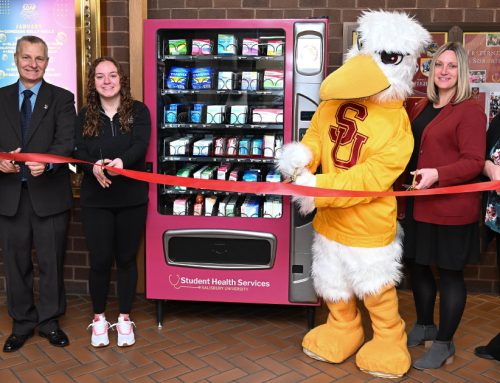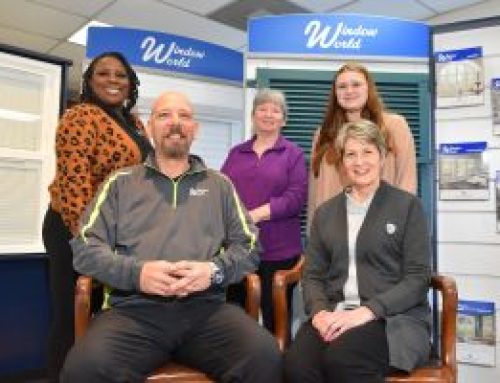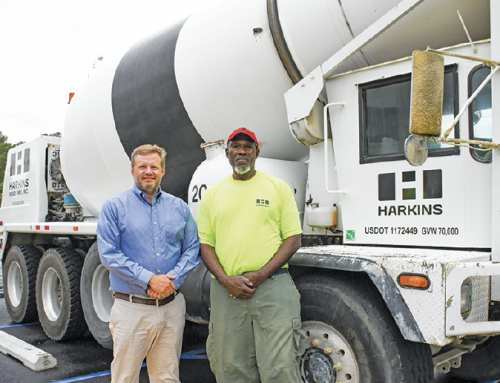Founded in 2011, Salisbury University’s Richard A. Henson Medical Simulation Center is a hub of learning and advancement for students and community members developing skills and knowledge for health professions. Operating under the newly developed College of Health and Human Services, the center focuses on providing health simulation experiences in addition to other educational opportunities and programs benefiting the wider community. In its nine years in operation, the simulation center has grown into a beacon of health education for Salisbury University and its surrounding area.
Named for benefactor, Richard A. Henson, the center expanded the work already in place in multiple health majors across Salisbury University’s campus. This space provides a dedicated centralized location for simulations to take place. It also creates an immersive experience by mimicking a clinical environment which includes patient rooms and a nurse’s station.
Simulation experiences are utilized to prepare students in health majors, such as nursing and respiratory therapy, for future work with patients. Simulated scenarios provide students an opportunity to utilize skills as they would in the field to better prepare them for real-life situations in their clinical placements and work experience.

Dr. Lisa Seldomridge, director, with a high-fidelity birthing simulator manikin.
Additionally, according to Director, Dr. Lisa Seldomridge, simulations foster, “leadership skills, advocacy for self and others, conflict management, and understanding of how to lead an interprofessional team.”
The environment, equipment, technology, and simulated patients work together to create an authentic learning practice. The aspects of the simulated environment are all important, but there is particular emphasis on the patients themselves.
The Richard A. Henson Medical Simulation Center utilizes two types of simulated patients: standardized patient actors and high fidelity manikins.
Standardized patient actors are highly trained to provide specific, expert-crafted scenarios in a way that embodies the factual clinical information along with appropriate body-language and emotion for an experience that is true-to-life. Currently, there are 13 fully trained standardized patient actors working regularly with this facility.
High fidelity manikins are state-of-the-art patient simulators and the available manikins at the center simulate a number of physiological reactions, such as giving birth, to allow students the chance to independently work through clinical situations without risk of harm to a patient.
While simulated experience is a major part of what the Richard A. Henson Medical Simulation Center provides and houses, it is far from the only function of this multifaceted center. This facility supports a variety of programming integral to the health professions it develops and serves. The space makes available trainings, educational tours, programming and laboratory space, classroom space and more.
Trainings are a major part of what is provided to both the Salisbury University community and the local community by the Richard A. Henson Medical Simulation Center. Regular offerings of cardiopulmonary resuscitation (CPR) certification, advanced cardiac life support (ACLS) certification, and neonatal resuscitation program (NRP) can be accessed at this location. Specialized trainings can also be offered, such as a recent customized workshop for Wicomico County school nurses which included respiratory assessment and nursing skills refreshers. For those who want to understand or learn more about what this simulation center provides, educational tours are offered for students and community groups interested in learning.
In addition to trainings and community education, space for programming and laboratory evaluation is seamlessly integrated into the center. The Eastern Shore Faculty Academy and Mentorship Initiative (ESFAMI), a grant-funded program focused on training clinical nurses with B.S.N or higher to become clinical nursing faculty, operates out of the Richard A. Henson Medical Simulation Center. Locally, the program utilizes the center’s meeting space and simulation environment to provide its curriculum, but ESFAMI expands beyond the local community and across the state, providing their educational experience through multiple partner colleges and universities.
In addition to ESFAMI operating in the center, the Applied Health Physiology Lab supports graduate students in advanced assessments related to the major. Providing this space only furthers health education advancements.
Dr. Seldomridge shared some recent developments for the Richard A. Henson Medical Simulation Center. Peninsula Regional Medical Center gifted two functional defibrillators, a value of around $18,000, to the center. In the summer of 2020, the Athletic Training program will become the seventh major on Salisbury University’s campus to utilize the center.
ESFAMI which operates on state grant funding through the Maryland Higher Education Commission’s NSP II grant, was invited to apply for continued funding this year and will be doing so to continue and expand the work the program has been providing since 2011. In appreciation for the work Salisbury University’s nursing program has done since its inception, Donna Parks, a member of the program’s first graduating class of 1979, provided a generous gift which led to the simulation center’s nursing station being named after Parks and her late husband.
An innovative, growth-seeking health education resource, the Richard A. Henson Medical Simulation Center is a great example of the learning opportunities available in our local community.
“This is an innovative, cutting-edge learning center that’s focused primarily on preparing health professionals, but it is also a resource for healthcare providers and other community groups,” Dr. Seldomridge stated about the center she directs.
Because the connection to the community is of great importance, Dr. Seldomridge also added: “I would like to invite people or community groups who would be interested to contact us at 410-546–2465 or email simcenter@salisbury.edu,” for more information.




